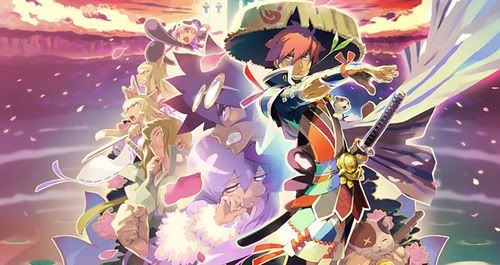
I am not a person who handles failure well. I am easily frustrated when things don’t go my way. When I face a seemingly insurmountable task in a video game — one that kills me over and over again — I’m more likely to drop the controller and walk away than I am to endure repeated defeats in order to discover the solution. Sorry, Super Meat Boy, I respect you, but you are most definitely not for me.
Imagine my surprise when a Japanese role-playing game with serious penalties for failure managed to completely charm me into accepting that winning isn’t everything and open my eyes to an entire genre in the process.
The game in question is the latest installment of Shiren the Wanderer, a series that hasn’t seen much action outside Japan. Shiren 5 hit the DS last December, and (thanks to a clever web promotion) I decided to give it a try. Save for a brief encounter with the Super Famicom original, I had never played a Shiren game before this one. It was a name I knew mostly thanks to Tim Rogers, who once wrote that playing Shiren the Wanderer “can make you understand the origins of the universe.”
Shiren is what’s known as a “roguelike” RPG, one that emphasizes strategy and punishes failure. Everything is turn based: For every step or action Shiren takes, the enemies respond. Levels are randomly generated; it’s been called “the RPG you can play 1,000 times.” If you die, Shiren returns to town at Level 1 without any equipment.

This initially sounded awful. “RPGs are all about building up stats and conquering bigger and better foes!” I thought, “Who wants to risk losing everything, especially when you don’t know what’s coming next?”
Shiren proved me wrong, though. With so much riding on the line, every move I made became wrought with tension. I never knew what lay around the next corner. Monsters were randomly placed, but They'll never ambush you Final Fantasy style. You can see them coming and decide to fight or flee. Eventually, they get so strong that you have no choice but to run away. That means grinding is useless — something I’m all for eliminating.
When death comes, and it inevitably does, it is harsh but not devastating. Everything that can be lost can be replaced…sometimes even recovered if you plan ahead. The randomness makes starting anew each time less of a “here we go again” feeling and more of an excited “I wonder what’ll happen this time?” sense of anticipation.

I don’t know if I’ll ever beat Shiren 5. I’ve reached what looks to be the top of Fortune Tower, but the large, angry deity I found there was most unfriendly. In a game where running away is often the best strategy, a giant boss fight seems rather out of character. However, the larger lesson I’ve learned from Shiren is that it’s OK to lose if the journey is fun.
The thrill of discovering an entire genre (subgenre, perhaps) of games to enjoy is a bit daunting, but I’m looking for other portable RPGs now to satisfy my newly found hunger. I recently picked up Cladun: This is an RPG! on PSP, and (while not strictly roguelike) its minidungeons are perfect for my morning commute.
If you’re a fan of roguelikes and want to recommend one, please do! And if my story about Shiren 5 made you curious, you can import it (fair warning: lots of Japanese text) or try an older, English edition.
Daniel Feit lives in Japan with his wife and son. His written work has been featured on Wired Game|Life, 1UP, GamePro and Film Junk. Follow him on Twitter @feitclub for gaming news, Japanese oddities, and photos of things Mr. Feit has eaten.


